Relationships Nurtured by CDC Over Decades Bring Indoor Toilets to Thousands in Northern Haiti During COVID-19 Pandemic
Summary
- CDC supported efforts in Haiti to meet the sanitation needs of families during the COVID-19 pandemic.
- Thousands of Haitians in the northern part of the country now have access to an indoor toilet.
- Eight out of 10 households with a SOIL toilet never had a toilet before.
- Household handwashing stations make it easier to keep hands clean and reduce the spread of COVID-19 and other diseases.
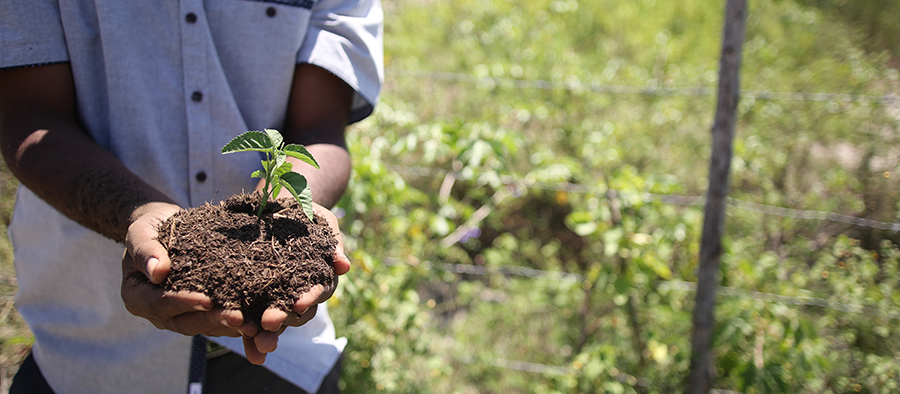
Man in Haiti holds plant grown in compost made in treatment plant that transforms human waste into fertile soil. Photo by SOIL (Sustainable Organic Integrated Livelihoods)
Access to clean water and sanitation is a basic human need and an essential part of reducing the spread of COVID-19. In countries around the world, including Haiti, this access is a challenge, and the use of public toilets or pits for human waste is common.
Early in the COVID-19 pandemic, the US Centers for Disease Control and Prevention’s (US CDC) country office in Haiti reached out to the Haiti Ministry of Public Health and Population (Ministère de la Santé Publique et de la Population or MSPP) and provided support for their efforts to help families living without indoor sanitation. MSPP called on the non-profit organization Sustainable Organic Integrated Livelihood – SOIL – which has been turning human waste into fertile soil in Haiti since 2013.
After several months of collaboration, thousands of Haitians in the northern part of the country now have access to an indoor toilet.
How the CDC/MSPP/SOIL Partnership Helps
In 2010, Haiti suffered a devastating earthquake 25 miles southwest of the capital Port-au-Prince. Hundreds of thousands of people died and more than 2 million were left homeless. After that earthquake, CDC pledged to help rebuild Haiti’s public health system.
A decade later, Haiti is still recovering from the massive damage caused by the 2010 quake and many more since then, leaving many households without proper indoor sanitation.
COVID-19 is a critical public health threat to the people of this Caribbean nation and to its health system. “The US CDC’s team in Haiti has worked closely with MSPP on many public health issues over the past ten-plus years,” says Ken Chen, senior public health advisor for US CDC’s office in Haiti. “We’ve also worked with SOIL in the past. These important relationships helped speed up the process of finding solutions to address the most urgent needs during the COVID-19 pandemic,” Chen adds.
CDC’s effort to help more households have indoor toilets began months before Haiti was struck by another devastating quake in August 2021, about 75 miles southwest of Port-au-Prince.
Improving Access to Toilets in Northern Haiti
In January 2020, the Pan American Health Organization reported that over one third (35%) of Haiti’s population lacked basic drinking water services and two thirds had limited or no sanitation services.
All three partners (US CDC/MSPP/SOIL) agreed that increasing access to toilets and clean water was needed most.
“The original plan was to build a big mobile toilet block and also deliver toilets to 150 households in Northern Haiti near Cap-Haitien,” says Sasha Kramer, Co-Founder and Executive Director of SOIL, which was created in Haiti in 2006.
However, when protective measures to prevent the spread of COVID-19, such as staying home to limit exposure to the virus, went into effect, those without toilets in their homes still had to go to public toilets or certain areas like fields to leave their waste. This was not safe.
“In discussions with US CDC and the Ministry of Public Health, we recommended moving all the resources for this project towards getting toilets into more than just 150 homes,” says Kramer. US CDC and MSPP agreed to this change to the original project plan.
“With the redistribution of resources, we installed toilets in 500 households by the spring of 2021,” says Kramer. “There are about six people living in each Haitian household. That means about 3,000 more people now have access to household sanitation as part of this partnership.”
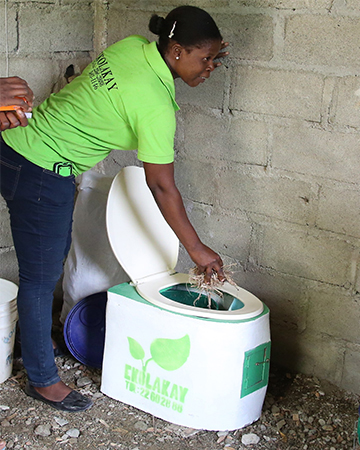
August 2019. SOIL team member shows how to use the waterless toilet using a recycled sugarcane material that removes odor and starts the composting process. Photo by Vic Hinterlang
Kramer estimates more than 8 out of 10 households with a SOIL toilet never had a toilet before. This project is giving these families dignity and safety because they no longer go outside or go to public places to use the toilet, especially during the pandemic.
How SOIL Works
SOIL builds waterless toilets that are delivered to households and provides buckets for human waste which are placed inside the toilet. SOIL also provides dry carbon materials made from recycled sugar cane called bonzodè. After the waterless toilet is used, the bonzodè (which means “good smell” in Haitian Creole) is spread over the waste to limit odor and flies. It also feeds the microbes in the waste.
May 2019. Construction of household toilets for families in Haiti provided by SOIL. Photo by Vic Hinterlang
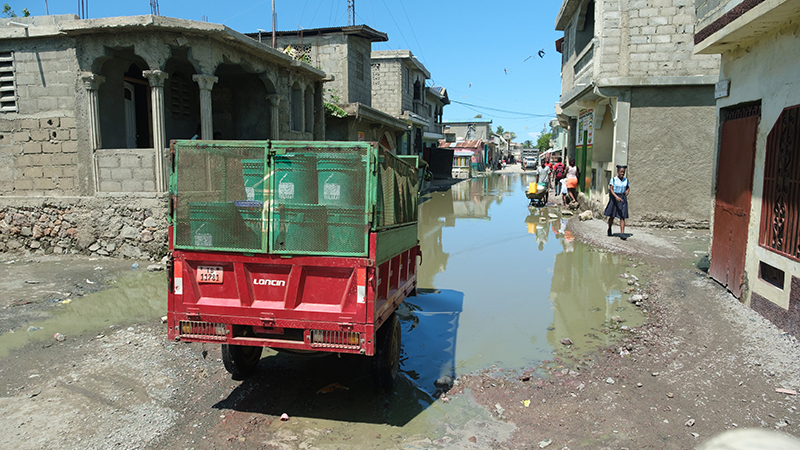
Buckets of human waste are collected weekly and taken to the waste treatment facility where it will be transformed into nutrient-rich organic compost. Photo by Felipe Jacome.
SOIL composting waste treatment facility in Haiti. Photo by SOIL
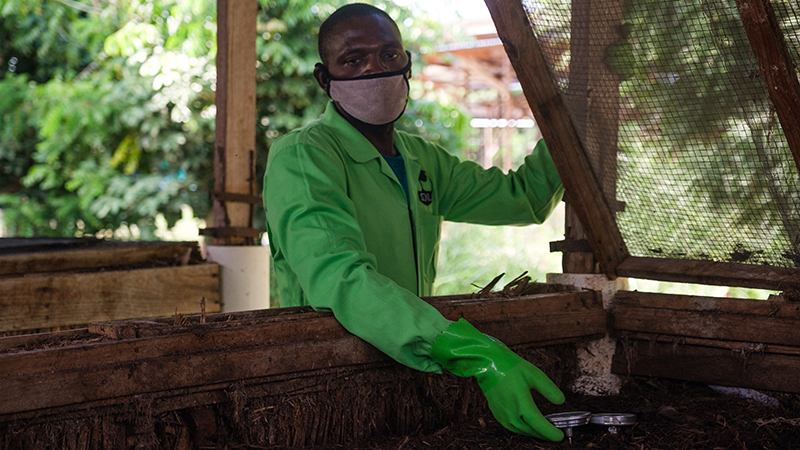
Employee tests temperature of compost in SOIL waste treatment facility. Photo by Felipe Jacome.
The waste is dumped into a large bin and then nature takes over. The microbes break down the waste and convert it into nutrient-rich soil. This process creates such high temperatures in the soil, that any germs that could make people sick are killed. The fertilizer that is created in this process can be used to grow food.
One benefit of this weekly sanitation collection system is that it can double as a network for distributing information. This has been very helpful during the COVID-19 pandemic because waste collectors are able to share messages about preventing the spread of the disease. SOIL printed pamphlets using public health messages developed by MSPP and US CDC. These pamphlets are provided when new waste containers are delivered.
Making It Easier to Wash Hands
Washing hands frequently helps reduce the spread of COVID-19 and other diseases. However, this is difficult for people living in households without indoor sanitation. That’s why providing household handwashers was another important part of the US CDC/MSPP/SOIL project.
Each household supported by this project received a handwasher, in addition to the indoor toilet. As of June 2021, household handwashers were delivered to 520 households.
More handwashers will be distributed in the coming months. In the end, about 1,300 households will get one of these handwashers as a result of the US CDC/MSPP/SOIL partnership.
The benefits of this program are many and will outlast the COVID-19 pandemic. More Haitians now have safe access to a functioning sanitation system. The environment improves because less waste is contaminating the soil and less synthetic fertilizer is needed. The nutrient-rich fertilizer restores land for farming.
“Another sustainable outcome of this partnership is that it creates jobs for locals and even creates ownership for some,” says Chen. “It’s a win-win situation.”
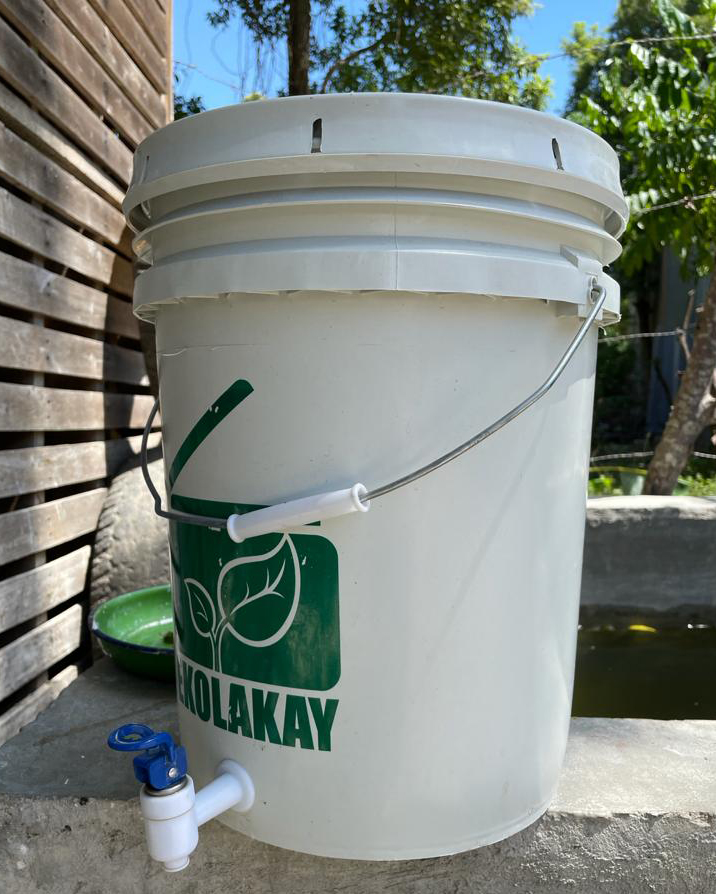
This bucket with a spigot is a handwashing station provided by the non-profit organization SOIL in Haiti. Photo by SOIL